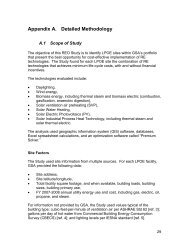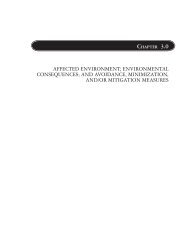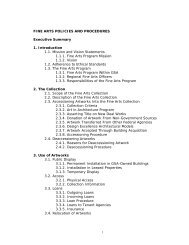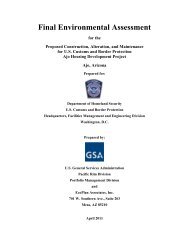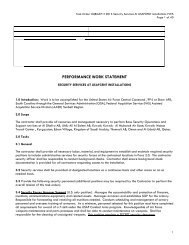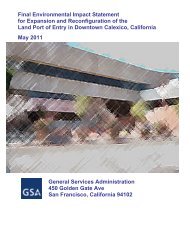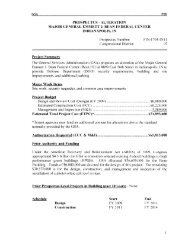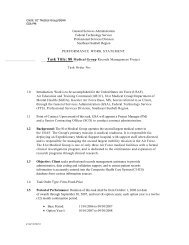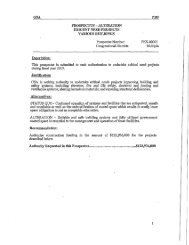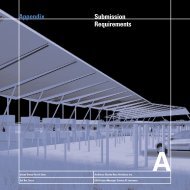Sustainable Development and Society - GSA
Sustainable Development and Society - GSA
Sustainable Development and Society - GSA
You also want an ePaper? Increase the reach of your titles
YUMPU automatically turns print PDFs into web optimized ePapers that Google loves.
<strong>Sustainable</strong> <strong>Development</strong> <strong>and</strong> <strong>Society</strong><br />
16<br />
packaging. This process resulted in a<br />
methodology that in the 1990s came to be<br />
called environmental life cycle analysis<br />
(LCA).<br />
With the rise of “product policy” <strong>and</strong><br />
“extended product (or producer)<br />
responsibility” during the 1990s, LCA<br />
shifted from a little-known “cottage<br />
industry” to become an internationally<br />
st<strong>and</strong>ardized analytical tool in support of<br />
environmental management. LCA is now<br />
used by thous<strong>and</strong>s of companies, many<br />
governments, consumer <strong>and</strong> environmental<br />
groups, <strong>and</strong> others to explain the “cradle-tograve”<br />
environmental consequences of<br />
product-related decisions.<br />
In 2002 the government leaders <strong>and</strong><br />
representatives from industry <strong>and</strong> civil<br />
society met at the World Summit on<br />
<strong>Sustainable</strong> <strong>Development</strong> in Johannesburg.<br />
One outcome was the “Plan of<br />
Implementation for Changing<br />
Unsustainable Patterns of Consumption<br />
<strong>and</strong> Production,” whose key elements<br />
included a call to “Improve the products <strong>and</strong><br />
services provided, while reducing<br />
environmental <strong>and</strong> health impacts, using<br />
where appropriate, science-based<br />
approaches, such as life-cycle analysis.”<br />
Thus LCA, originally developed to inform<br />
environmental policies at the dawn of<br />
modern environmentalism, was called upon<br />
to assist the current search for sustainable<br />
patterns of consumption <strong>and</strong> production.<br />
Recently it has become common to refer to<br />
the “three pillars” of sustainable<br />
development: economic growth, ecological<br />
balance, <strong>and</strong> social progress. 1 Traditional<br />
LCA has addressed only the environmental<br />
pillar. However, integrating economic<br />
modeling <strong>and</strong> a “what-if” perspective opens<br />
up the potential to address more of the<br />
sustainability agenda, helping to avoid<br />
“burden shifting” among the social,<br />
environmental, <strong>and</strong> economic objectives,<br />
<strong>and</strong> potentially helping to build a broader<br />
base of support for policy proposals by<br />
addressing the concerns of a broader group<br />
of stakeholders.<br />
There are several ways in which this<br />
expansion can take place. By integrating<br />
economic models <strong>and</strong> databases, LCA can<br />
address impacts <strong>and</strong> performance<br />
measures which are routinely tracked at the<br />
economic sectors level rather than through<br />
engineering unit processes. An example of<br />
such an impact group is occupational<br />
health <strong>and</strong> safety. A recent investigation<br />
concluded that occupational health <strong>and</strong><br />
safety issues <strong>and</strong> incidents in product<br />
supply chains may be in the same order of<br />
magnitude as the expected near-term<br />
human health consequences of supply<br />
chain pollution releases. 2 That paper also<br />
pointed to the clear need to develop better<br />
reporting systems <strong>and</strong> databases on<br />
occupational impacts in industrialized <strong>and</strong><br />
non-industrialized economies.<br />
Secondly, integrating this modeling<br />
approach allows us to acknowledge that<br />
product supply chain activities bring<br />
benefits as well as burdens for the agenda<br />
of sustainable development. Sustained<br />
increases in economic output among<br />
developing countries are linked to major<br />
gains in human health through the<br />
mechanisms of income-poverty reduction,<br />
increased investment in <strong>and</strong> access to<br />
education, <strong>and</strong> increased public<br />
investments in the public health<br />
infrastructure. 3 Traditional LCA, focused<br />
strictly on pollution impacts <strong>and</strong> blind to<br />
development benefits, is seen by some<br />
sustainability analysts from developing<br />
countries as biased against their primary<br />
concerns. By addressing the benefits of<br />
economic development alongside the costs<br />
of pollution <strong>and</strong> resource degradation,<br />
extensions of LCA have the potential to<br />
meet these concerns <strong>and</strong> to point to truly<br />
sustainable solutions to the challenges of<br />
consumption <strong>and</strong> production in the 21st<br />
century.




